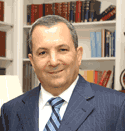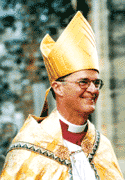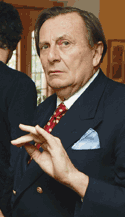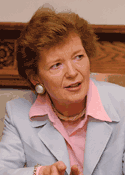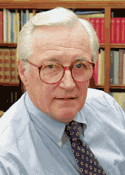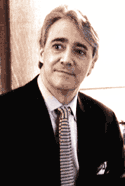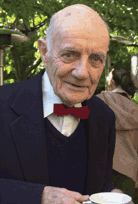
 |
||
The Yale Alumni Magazine is owned and operated by Yale Alumni Publications, Inc., a nonprofit corporation independent of Yale University. The content of the magazine and its website is the responsibility of the editors and does not necessarily reflect the views of Yale or its officers. |
Former Israeli prime minister Ehud Barak urged an end to terrorism and dictatorship in the Middle East in an October 10 address at Battell Chapel. Arguing for the same “moral and strategic clarity” the U.S. showed in Afghanistan a year ago, he warned that “the greatest risk now lies in inaction.” The hope that Barak expressed for a peaceful future was tempered by his experience with daily acts of violence. “We live in a tough neighborhood. It’s not the Midwest, it’s the Middle East.”
The Berkeley Divinity School welcomed the Most Rev. Frank Griswold, presiding bishop of the Episcopal Church, to its annual convocation on October 16. Griswold, who is the head administrator and “chief pastor” of the American church, preached a sermon on the “Oxford Martyrs,” a trio of 16th-century scholars who were killed for their defense of Anglicanism during the reign of Queen Mary. “The struggle for truth requires wits and courage, courage that comes from Another,” said Griswold.
On October 17, the Yale Dramat made actor Barry Humphries an honorary member. The Australian comic is better known as his pink-haired alter ego, “Dame Edna,” who played New Haven’s Shubert Theater as part of her U.S. tour. Although Dame Edna has had several TV shows, Humphries said at a master’s tea that “the theater for me will always be more interesting than film and television. When you watch an audience laugh, it changes color. That doesn’t happen when you watch television, in boxer shorts, with a six-pack, on a bean bag.”
Coming off a five-year term as United Nations Commissioner for Human Rights, former president of Ireland Mary Robinson came to the Law School Auditorium on October 8 to give the annual Coca-Cola World Fund at Yale Lecture. Robinson talked about the progress being made in human rights and wondered aloud about the challenges and opportunities posed by globalization. “How do we build an ethical globalization that bridges the gap between north and south, rich and poor, secular and religious?” she asked.
At the end of the month, John Ryden will retire after 23 years as director of Yale University Press. Some 4,000 books have been released by the Press during Ryden’s tenure, among them the acclaimed Annals of Communism series, the multimedia French in Action course, Camille Paglia’s breakout hit Sexual Personae, and Ahmed Rashid’s Taliban. Ryden plans to stay in New Haven and work as a consultant; President Richard Levin has appointed a search committee to find his successor.
“If I had a real radio voice, I’d be doing butter commercials,” said National Public Radio’s Scott Simon at an October 22 master’s tea in Calhoun College. The reporter, writer, and host of Weekend Edition Saturday said that radio journalism retains a “sense of personality” that has disappeared from most newspapers. Simon said he tries to deliver the news with a “light touch,” explaining that he had a guest read a children’s story on the Saturday after September 11 “because emotionally, it fit.” Close-Up Within two weeks of winning a Nobel Prize for chemistry in October, John Fenn '40PhD was back at Yale, telling his story to students and faculty who gathered for a master’s tea in Jonathan Edwards College.
“I should say in true Yale tradition that life didn’t begin until I got here,” announced Fenn before sharing a biography rich in variation and charming anecdotes. Fenn graduated from Berea College, a tuition-free liberal arts college in the Appalachians of his native Kentucky. Though he had planned to continue his studies at Northwestern University, Fenn changed his mind when the father of a Yale-bound friend offered to drive him northeast. And so, said Fenn, “I came to Yale because I got a free ride to New Haven.” By the time he returned to Yale to teach in 1967, Fenn had worked in the private sector, taught at Princeton, and overseen a Navy-funded research project on jet propulsion. After 20 years at Yale, he faced mandatory retirement in 1987. Seven years later, he was named a research professor at Virginia Commonwealth University, where he still works. Fenn’s award-winning research, conducted during his tenure at Yale, refined mass spectrometry, a method of identifying chemical compounds based on the weights of individual atoms and molecules. |
||||||||||||||||
|
|
|
|
|
|
|
|
©1992–2012, Yale Alumni Publications, Inc. All rights reserved. Yale Alumni Magazine, P.O. Box 1905, New Haven, CT 06509-1905, USA. yam@yale.edu |
||
